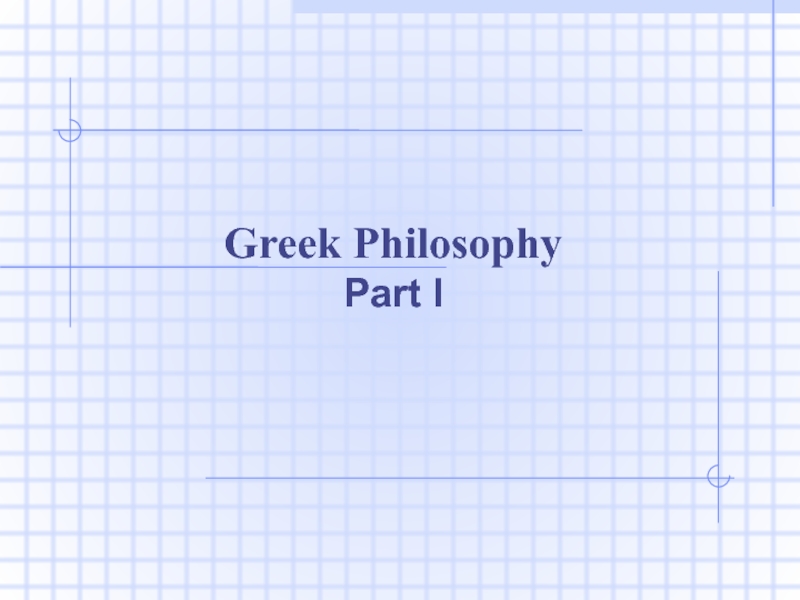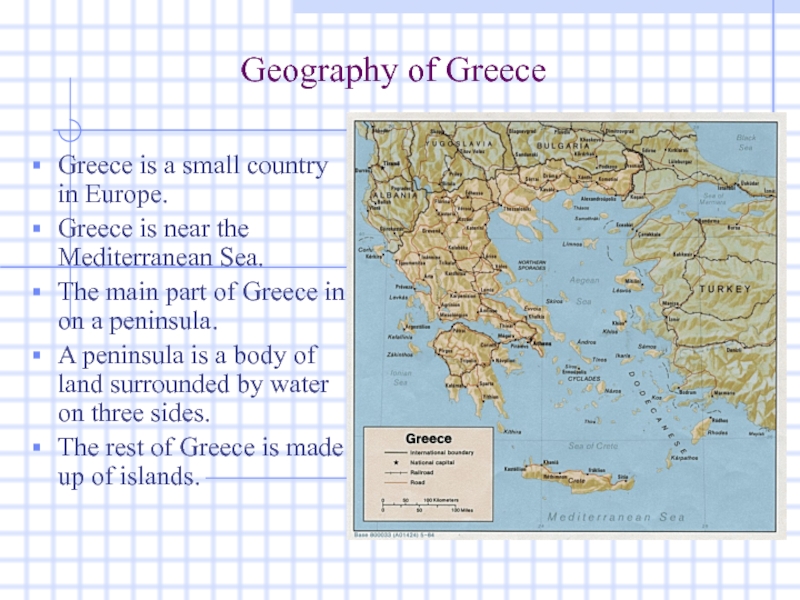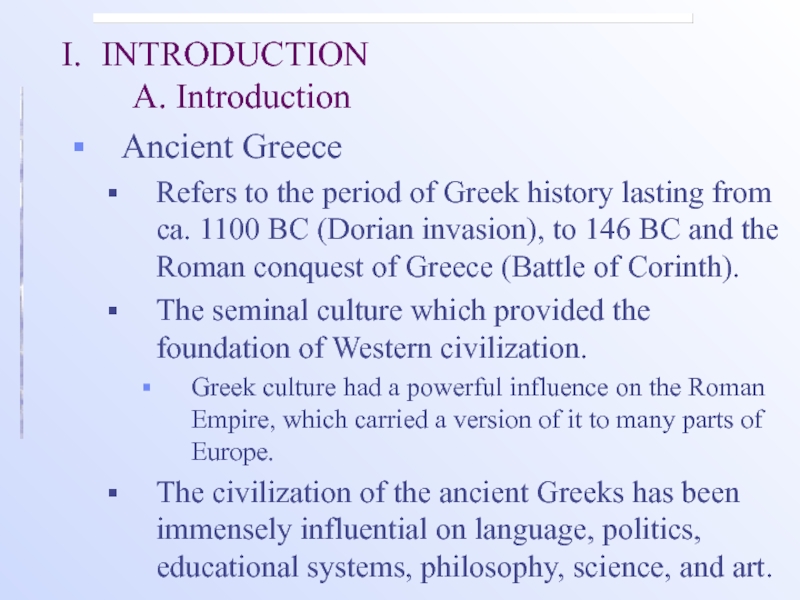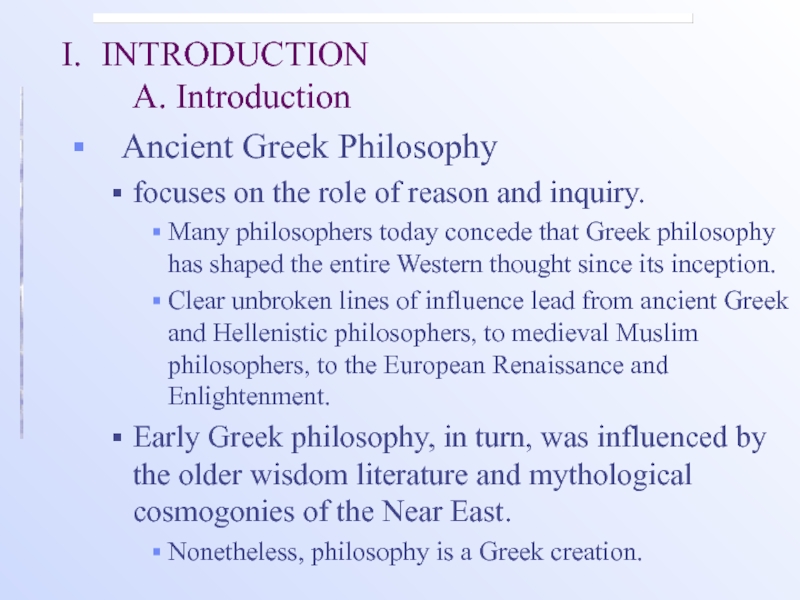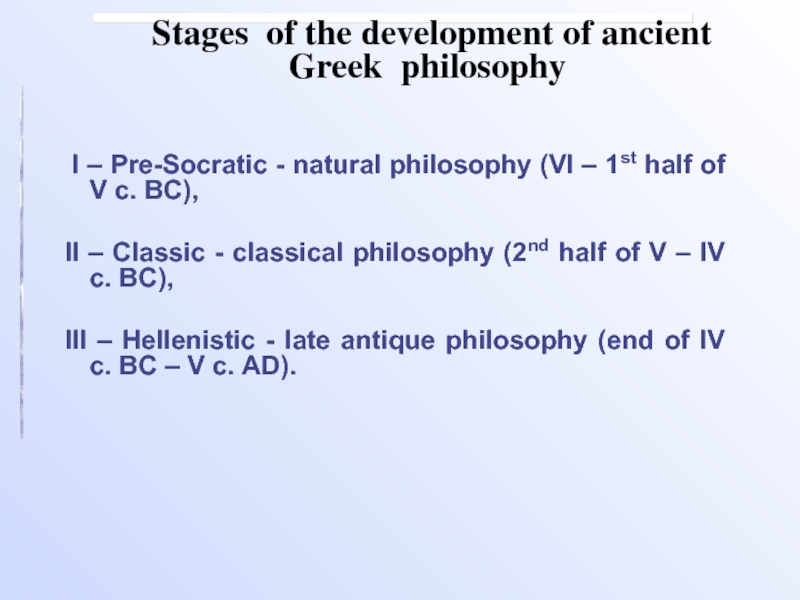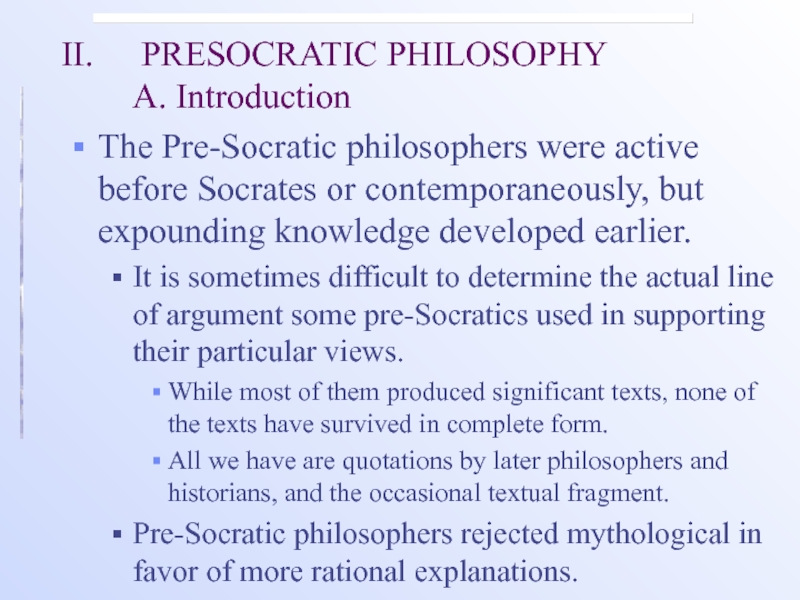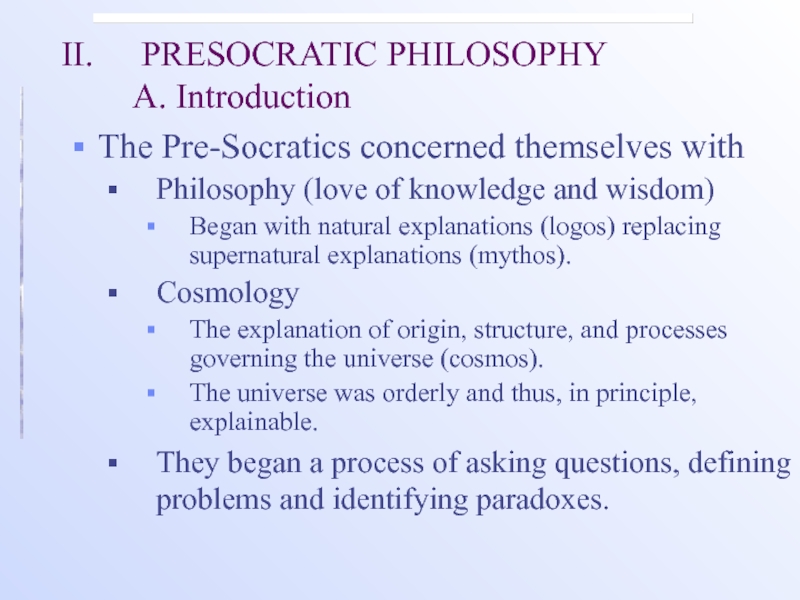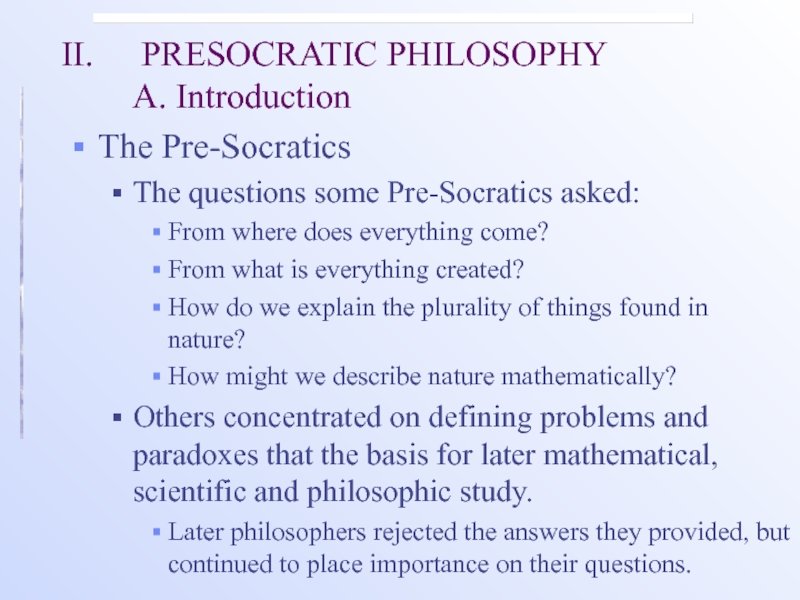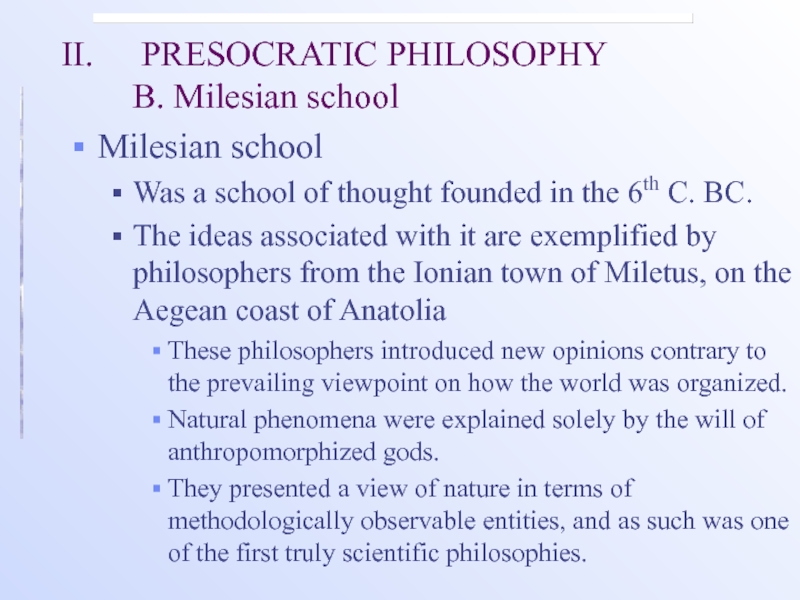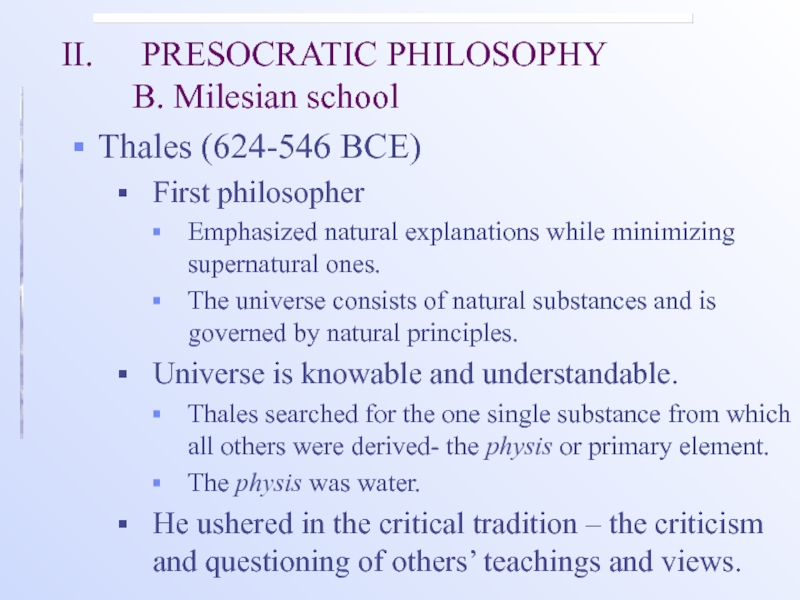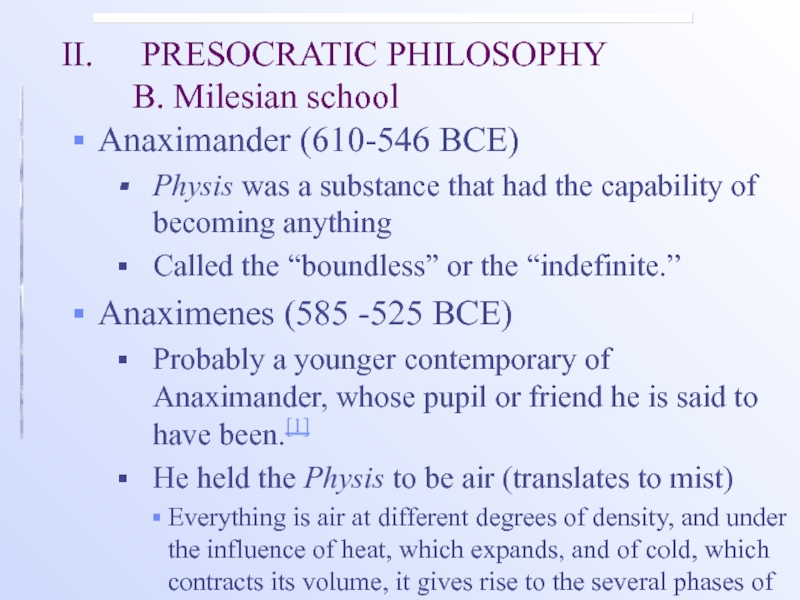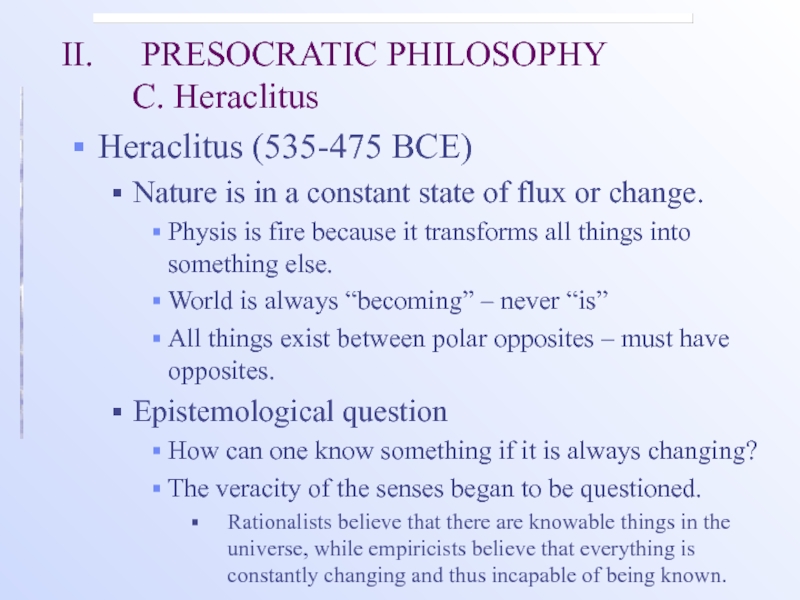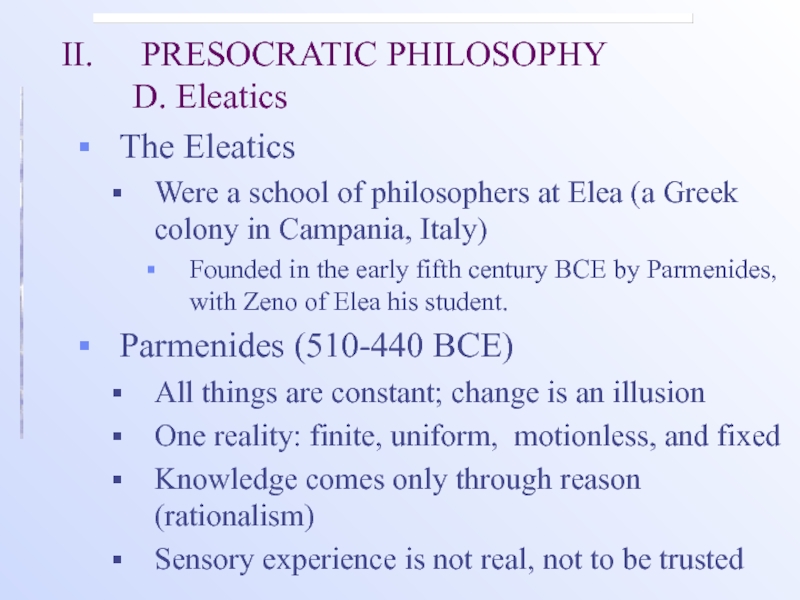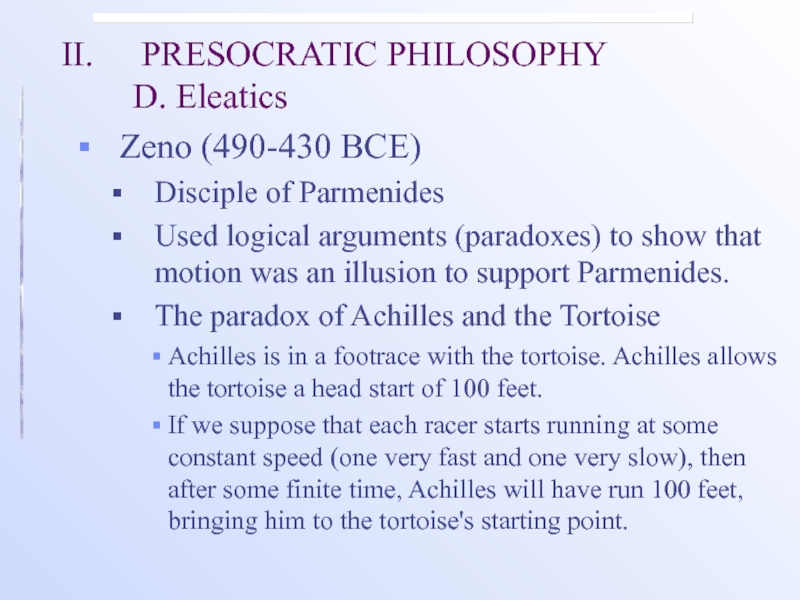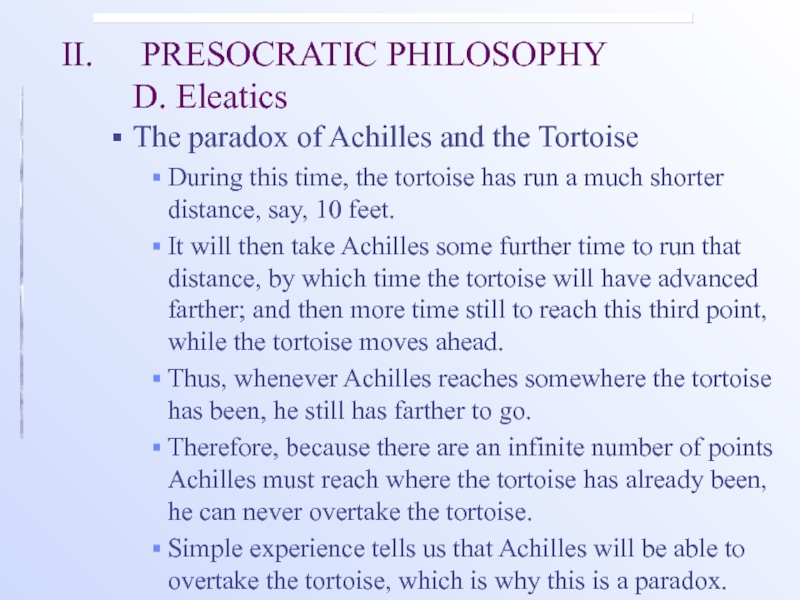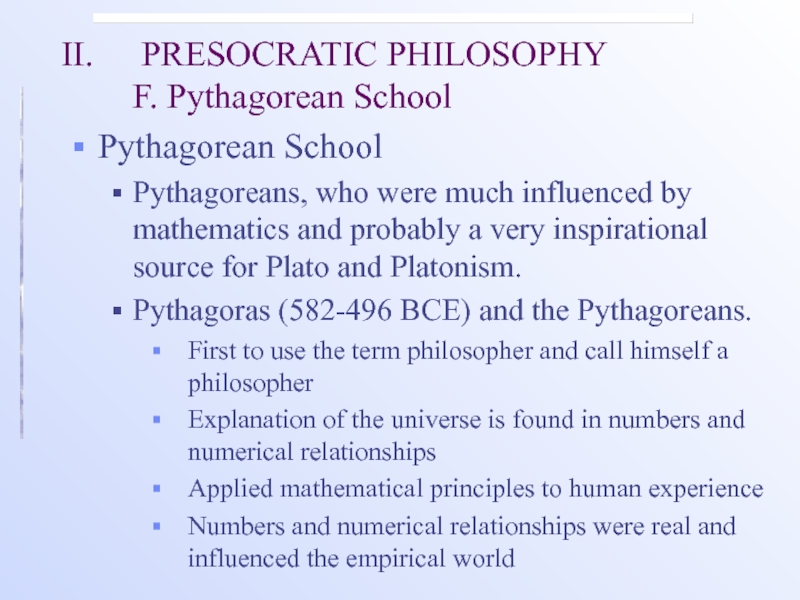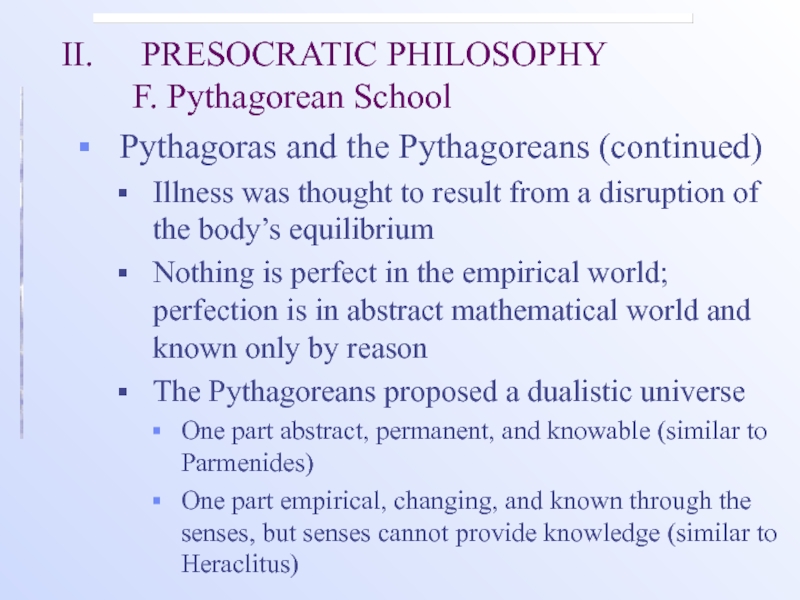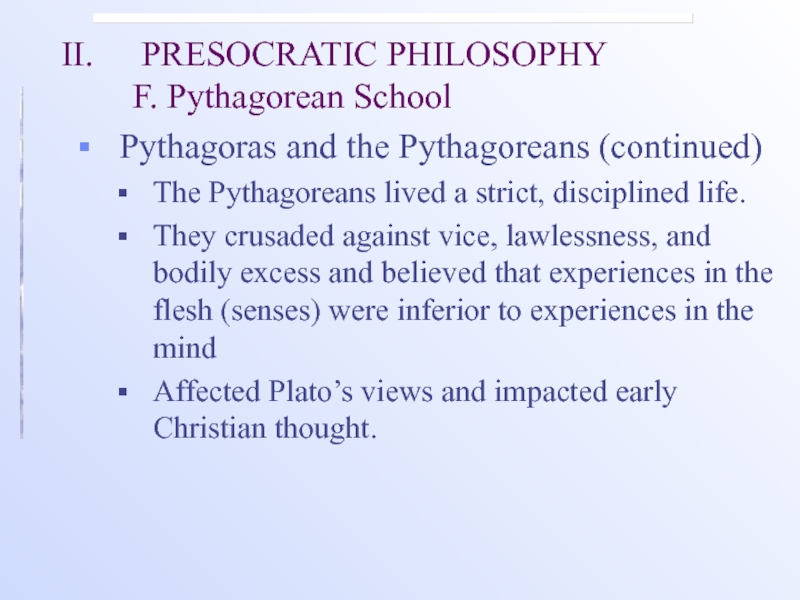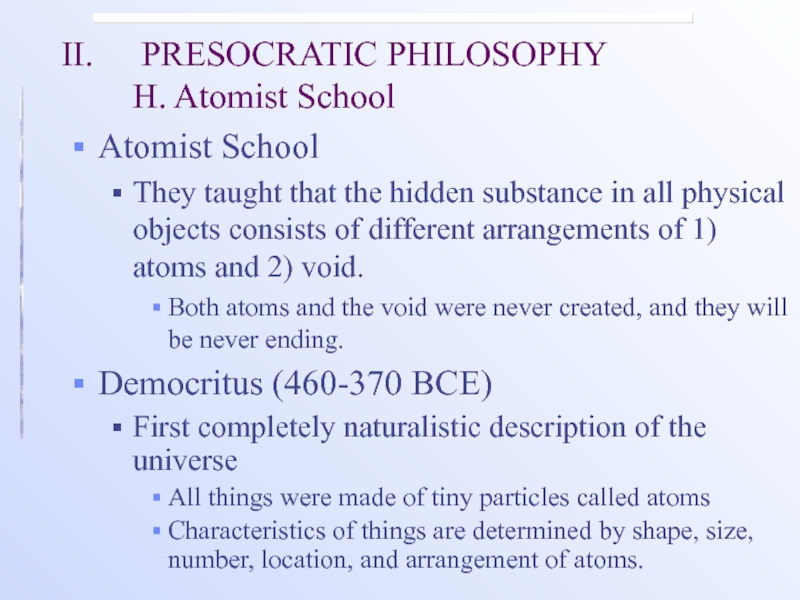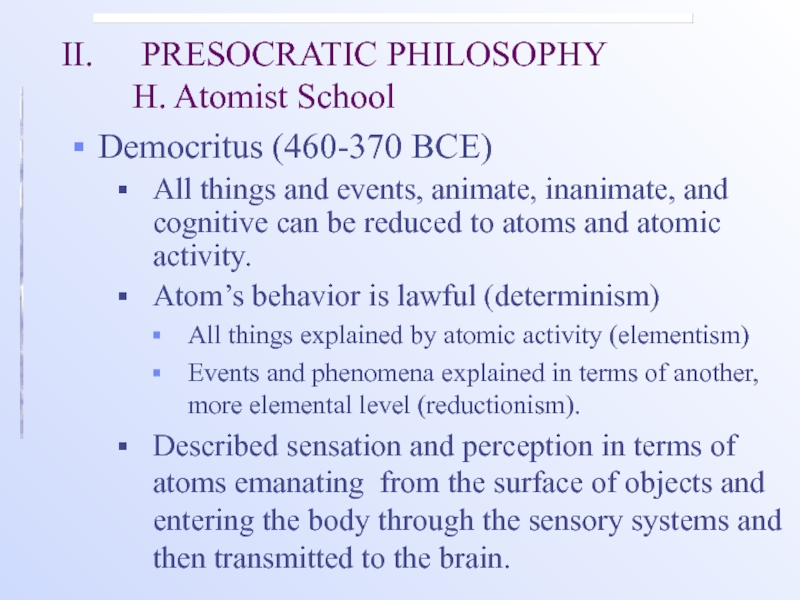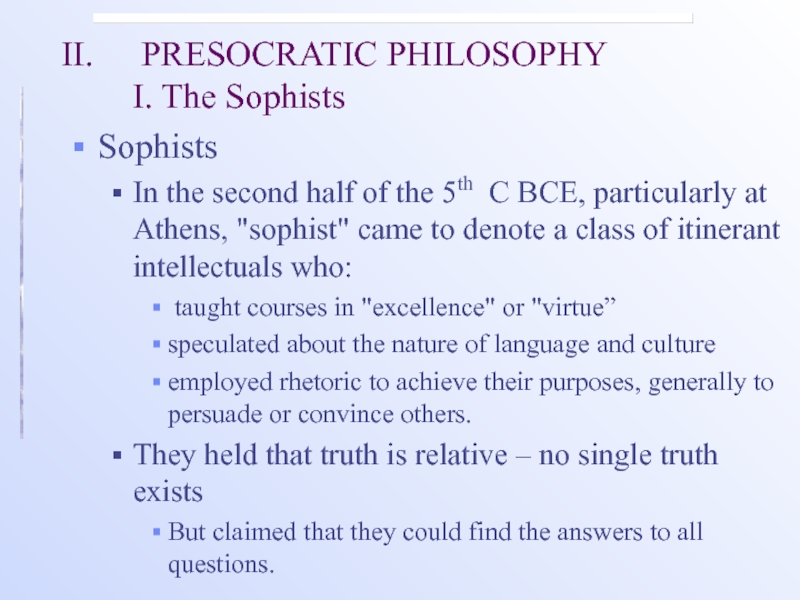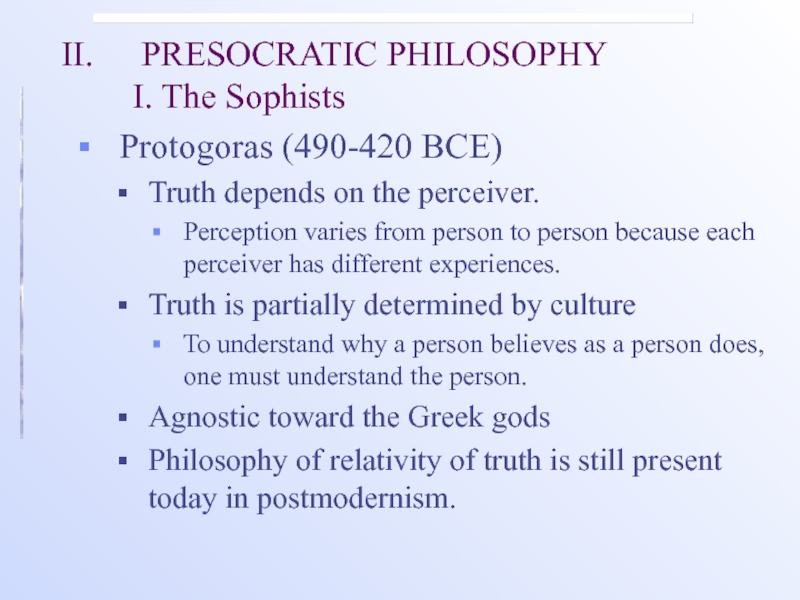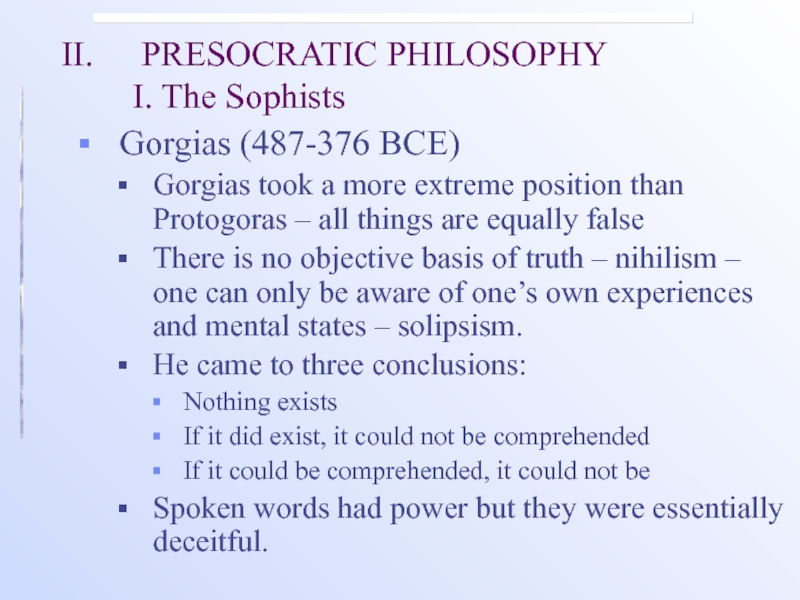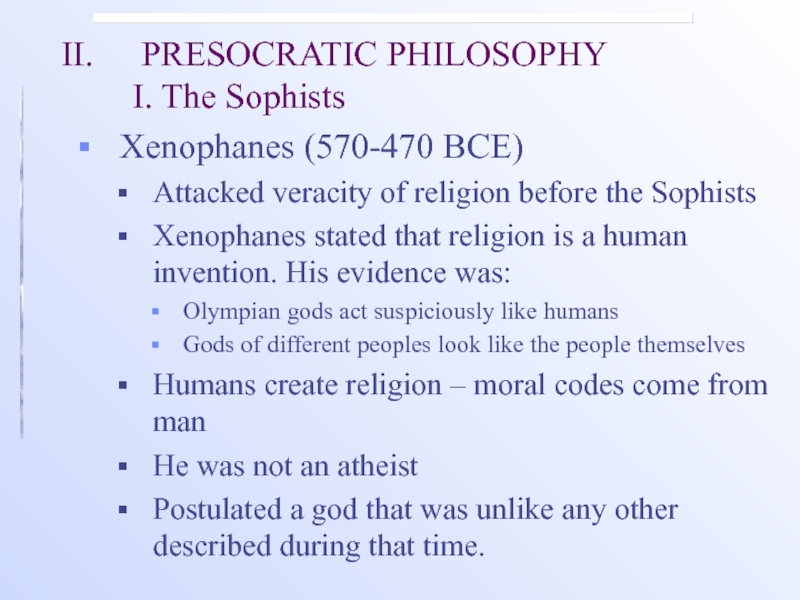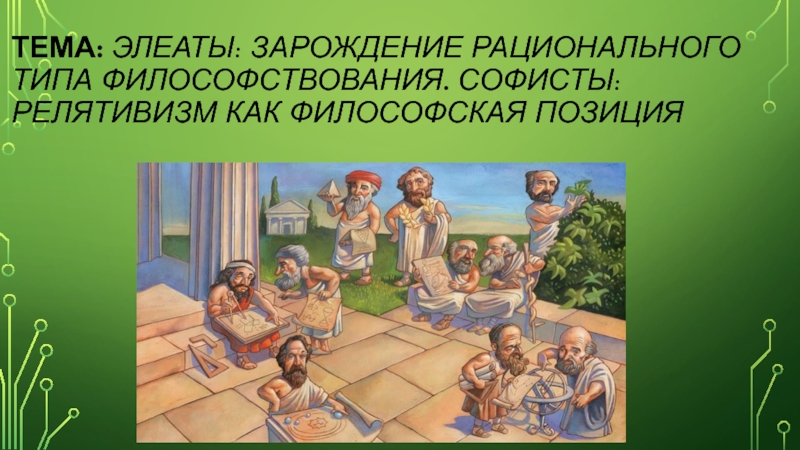- Главная
- Разное
- Дизайн
- Бизнес и предпринимательство
- Аналитика
- Образование
- Развлечения
- Красота и здоровье
- Финансы
- Государство
- Путешествия
- Спорт
- Недвижимость
- Армия
- Графика
- Культурология
- Еда и кулинария
- Лингвистика
- Английский язык
- Астрономия
- Алгебра
- Биология
- География
- Детские презентации
- Информатика
- История
- Литература
- Маркетинг
- Математика
- Медицина
- Менеджмент
- Музыка
- МХК
- Немецкий язык
- ОБЖ
- Обществознание
- Окружающий мир
- Педагогика
- Русский язык
- Технология
- Физика
- Философия
- Химия
- Шаблоны, картинки для презентаций
- Экология
- Экономика
- Юриспруденция
Greek philosophy презентация
Содержание
- 1. Greek philosophy
- 2. Geography of Greece Greece is a small
- 3. I. INTRODUCTION A. Introduction Ancient Greece
- 4. I. INTRODUCTION A. Introduction Ancient Greek
- 5. І – Pre-Socratic - natural
- 6. II. PRESOCRATIC PHILOSOPHY A. Introduction The
- 7. II. PRESOCRATIC PHILOSOPHY A. Introduction The
- 8. II. PRESOCRATIC PHILOSOPHY A. Introduction The
- 9. II. PRESOCRATIC PHILOSOPHY B. Milesian school
- 10. II. PRESOCRATIC PHILOSOPHY B. Milesian school
- 11. II. PRESOCRATIC PHILOSOPHY B. Milesian school
- 12. II. PRESOCRATIC PHILOSOPHY C. Heraclitus Heraclitus
- 13. II. PRESOCRATIC PHILOSOPHY D. Eleatics The
- 14. II. PRESOCRATIC PHILOSOPHY D. Eleatics Zeno
- 15. II. PRESOCRATIC PHILOSOPHY D. Eleatics The
- 16. II. PRESOCRATIC PHILOSOPHY F. Pythagorean School
- 17. II. PRESOCRATIC PHILOSOPHY F. Pythagorean School
- 18. II. PRESOCRATIC PHILOSOPHY F. Pythagorean School
- 19. II. PRESOCRATIC PHILOSOPHY H. Atomist School
- 20. II. PRESOCRATIC PHILOSOPHY H. Atomist School
- 21. II. PRESOCRATIC PHILOSOPHY I. The Sophists Sophists
- 22. II. PRESOCRATIC PHILOSOPHY I. The Sophists Protogoras
- 23. II. PRESOCRATIC PHILOSOPHY I. The Sophists Gorgias
- 24. II. PRESOCRATIC PHILOSOPHY I. The Sophists Xenophanes
Слайд 2Geography of Greece
Greece is a small country in Europe.
Greece is near
the Mediterranean Sea.
The main part of Greece in on a peninsula.
A peninsula is a body of land surrounded by water on three sides.
The rest of Greece is made up of islands.
The main part of Greece in on a peninsula.
A peninsula is a body of land surrounded by water on three sides.
The rest of Greece is made up of islands.
Слайд 3I. INTRODUCTION
A. Introduction
Ancient Greece
Refers to the period of Greek
history lasting from ca. 1100 BC (Dorian invasion), to 146 BC and the Roman conquest of Greece (Battle of Corinth).
The seminal culture which provided the foundation of Western civilization.
Greek culture had a powerful influence on the Roman Empire, which carried a version of it to many parts of Europe.
The civilization of the ancient Greeks has been immensely influential on language, politics, educational systems, philosophy, science, and art.
The seminal culture which provided the foundation of Western civilization.
Greek culture had a powerful influence on the Roman Empire, which carried a version of it to many parts of Europe.
The civilization of the ancient Greeks has been immensely influential on language, politics, educational systems, philosophy, science, and art.
Слайд 4I. INTRODUCTION
A. Introduction
Ancient Greek Philosophy
focuses on the role of
reason and inquiry.
Many philosophers today concede that Greek philosophy has shaped the entire Western thought since its inception.
Clear unbroken lines of influence lead from ancient Greek and Hellenistic philosophers, to medieval Muslim philosophers, to the European Renaissance and Enlightenment.
Early Greek philosophy, in turn, was influenced by the older wisdom literature and mythological cosmogonies of the Near East.
Nonetheless, philosophy is a Greek creation.
Many philosophers today concede that Greek philosophy has shaped the entire Western thought since its inception.
Clear unbroken lines of influence lead from ancient Greek and Hellenistic philosophers, to medieval Muslim philosophers, to the European Renaissance and Enlightenment.
Early Greek philosophy, in turn, was influenced by the older wisdom literature and mythological cosmogonies of the Near East.
Nonetheless, philosophy is a Greek creation.
Слайд 5
І – Pre-Socratic - natural philosophy (VІ – 1st half
of V с. BC),
ІІ – Classic - classical philosophy (2nd half of V – ІV с. BC),
ІІІ – Hellenistic - late antique philosophy (end of ІV с. BC – V с. AD).
ІІ – Classic - classical philosophy (2nd half of V – ІV с. BC),
ІІІ – Hellenistic - late antique philosophy (end of ІV с. BC – V с. AD).
Stages of the development of ancient Greek philosophy
Слайд 6II. PRESOCRATIC PHILOSOPHY
A. Introduction
The Pre-Socratic philosophers were active before Socrates
or contemporaneously, but expounding knowledge developed earlier.
It is sometimes difficult to determine the actual line of argument some pre-Socratics used in supporting their particular views.
While most of them produced significant texts, none of the texts have survived in complete form.
All we have are quotations by later philosophers and historians, and the occasional textual fragment.
Pre-Socratic philosophers rejected mythological in favor of more rational explanations.
It is sometimes difficult to determine the actual line of argument some pre-Socratics used in supporting their particular views.
While most of them produced significant texts, none of the texts have survived in complete form.
All we have are quotations by later philosophers and historians, and the occasional textual fragment.
Pre-Socratic philosophers rejected mythological in favor of more rational explanations.
Слайд 7II. PRESOCRATIC PHILOSOPHY
A. Introduction
The Pre-Socratics concerned themselves with
Philosophy (love
of knowledge and wisdom)
Began with natural explanations (logos) replacing supernatural explanations (mythos).
Cosmology
The explanation of origin, structure, and processes governing the universe (cosmos).
The universe was orderly and thus, in principle, explainable.
They began a process of asking questions, defining problems and identifying paradoxes.
Began with natural explanations (logos) replacing supernatural explanations (mythos).
Cosmology
The explanation of origin, structure, and processes governing the universe (cosmos).
The universe was orderly and thus, in principle, explainable.
They began a process of asking questions, defining problems and identifying paradoxes.
Слайд 8II. PRESOCRATIC PHILOSOPHY
A. Introduction
The Pre-Socratics
The questions some Pre-Socratics asked:
From where
does everything come?
From what is everything created?
How do we explain the plurality of things found in nature?
How might we describe nature mathematically?
Others concentrated on defining problems and paradoxes that the basis for later mathematical, scientific and philosophic study.
Later philosophers rejected the answers they provided, but continued to place importance on their questions.
From what is everything created?
How do we explain the plurality of things found in nature?
How might we describe nature mathematically?
Others concentrated on defining problems and paradoxes that the basis for later mathematical, scientific and philosophic study.
Later philosophers rejected the answers they provided, but continued to place importance on their questions.
Слайд 9II. PRESOCRATIC PHILOSOPHY
B. Milesian school
Milesian school
Was a school of
thought founded in the 6th C. BC.
The ideas associated with it are exemplified by philosophers from the Ionian town of Miletus, on the Aegean coast of Anatolia
These philosophers introduced new opinions contrary to the prevailing viewpoint on how the world was organized.
Natural phenomena were explained solely by the will of anthropomorphized gods.
They presented a view of nature in terms of methodologically observable entities, and as such was one of the first truly scientific philosophies.
The ideas associated with it are exemplified by philosophers from the Ionian town of Miletus, on the Aegean coast of Anatolia
These philosophers introduced new opinions contrary to the prevailing viewpoint on how the world was organized.
Natural phenomena were explained solely by the will of anthropomorphized gods.
They presented a view of nature in terms of methodologically observable entities, and as such was one of the first truly scientific philosophies.
Слайд 10II. PRESOCRATIC PHILOSOPHY
B. Milesian school
Thales (624-546 BCE)
First philosopher
Emphasized natural explanations
while minimizing supernatural ones.
The universe consists of natural substances and is governed by natural principles.
Universe is knowable and understandable.
Thales searched for the one single substance from which all others were derived- the physis or primary element.
The physis was water.
He ushered in the critical tradition – the criticism and questioning of others’ teachings and views.
The universe consists of natural substances and is governed by natural principles.
Universe is knowable and understandable.
Thales searched for the one single substance from which all others were derived- the physis or primary element.
The physis was water.
He ushered in the critical tradition – the criticism and questioning of others’ teachings and views.
Слайд 11II. PRESOCRATIC PHILOSOPHY
B. Milesian school
Anaximander (610-546 BCE)
Physis was a
substance that had the capability of becoming anything
Called the “boundless” or the “indefinite.”
Anaximenes (585 -525 BCE)
Probably a younger contemporary of Anaximander, whose pupil or friend he is said to have been.[1]
He held the Physis to be air (translates to mist)
Everything is air at different degrees of density, and under the influence of heat, which expands, and of cold, which contracts its volume, it gives rise to the several phases of existence.
Called the “boundless” or the “indefinite.”
Anaximenes (585 -525 BCE)
Probably a younger contemporary of Anaximander, whose pupil or friend he is said to have been.[1]
He held the Physis to be air (translates to mist)
Everything is air at different degrees of density, and under the influence of heat, which expands, and of cold, which contracts its volume, it gives rise to the several phases of existence.
Слайд 12II. PRESOCRATIC PHILOSOPHY
C. Heraclitus
Heraclitus (535-475 BCE)
Nature is in a
constant state of flux or change.
Physis is fire because it transforms all things into something else.
World is always “becoming” – never “is”
All things exist between polar opposites – must have opposites.
Epistemological question
How can one know something if it is always changing?
The veracity of the senses began to be questioned.
Rationalists believe that there are knowable things in the universe, while empiricists believe that everything is constantly changing and thus incapable of being known.
Physis is fire because it transforms all things into something else.
World is always “becoming” – never “is”
All things exist between polar opposites – must have opposites.
Epistemological question
How can one know something if it is always changing?
The veracity of the senses began to be questioned.
Rationalists believe that there are knowable things in the universe, while empiricists believe that everything is constantly changing and thus incapable of being known.
Слайд 13II. PRESOCRATIC PHILOSOPHY
D. Eleatics
The Eleatics
Were a school of philosophers
at Elea (a Greek colony in Campania, Italy)
Founded in the early fifth century BCE by Parmenides, with Zeno of Elea his student.
Parmenides (510-440 BCE)
All things are constant; change is an illusion
One reality: finite, uniform, motionless, and fixed
Knowledge comes only through reason (rationalism)
Sensory experience is not real, not to be trusted
Founded in the early fifth century BCE by Parmenides, with Zeno of Elea his student.
Parmenides (510-440 BCE)
All things are constant; change is an illusion
One reality: finite, uniform, motionless, and fixed
Knowledge comes only through reason (rationalism)
Sensory experience is not real, not to be trusted
Слайд 14II. PRESOCRATIC PHILOSOPHY
D. Eleatics
Zeno (490-430 BCE)
Disciple of Parmenides
Used logical
arguments (paradoxes) to show that motion was an illusion to support Parmenides.
The paradox of Achilles and the Tortoise
Achilles is in a footrace with the tortoise. Achilles allows the tortoise a head start of 100 feet.
If we suppose that each racer starts running at some constant speed (one very fast and one very slow), then after some finite time, Achilles will have run 100 feet, bringing him to the tortoise's starting point.
The paradox of Achilles and the Tortoise
Achilles is in a footrace with the tortoise. Achilles allows the tortoise a head start of 100 feet.
If we suppose that each racer starts running at some constant speed (one very fast and one very slow), then after some finite time, Achilles will have run 100 feet, bringing him to the tortoise's starting point.
Слайд 15II. PRESOCRATIC PHILOSOPHY
D. Eleatics
The paradox of Achilles and the Tortoise
During
this time, the tortoise has run a much shorter distance, say, 10 feet.
It will then take Achilles some further time to run that distance, by which time the tortoise will have advanced farther; and then more time still to reach this third point, while the tortoise moves ahead.
Thus, whenever Achilles reaches somewhere the tortoise has been, he still has farther to go.
Therefore, because there are an infinite number of points Achilles must reach where the tortoise has already been, he can never overtake the tortoise.
Simple experience tells us that Achilles will be able to overtake the tortoise, which is why this is a paradox.
It will then take Achilles some further time to run that distance, by which time the tortoise will have advanced farther; and then more time still to reach this third point, while the tortoise moves ahead.
Thus, whenever Achilles reaches somewhere the tortoise has been, he still has farther to go.
Therefore, because there are an infinite number of points Achilles must reach where the tortoise has already been, he can never overtake the tortoise.
Simple experience tells us that Achilles will be able to overtake the tortoise, which is why this is a paradox.
Слайд 16II. PRESOCRATIC PHILOSOPHY
F. Pythagorean School
Pythagorean School
Pythagoreans, who were much influenced
by mathematics and probably a very inspirational source for Plato and Platonism.
Pythagoras (582-496 BCE) and the Pythagoreans.
First to use the term philosopher and call himself a philosopher
Explanation of the universe is found in numbers and numerical relationships
Applied mathematical principles to human experience
Numbers and numerical relationships were real and influenced the empirical world
Pythagoras (582-496 BCE) and the Pythagoreans.
First to use the term philosopher and call himself a philosopher
Explanation of the universe is found in numbers and numerical relationships
Applied mathematical principles to human experience
Numbers and numerical relationships were real and influenced the empirical world
Слайд 17II. PRESOCRATIC PHILOSOPHY
F. Pythagorean School
Pythagoras and the Pythagoreans (continued)
Illness was
thought to result from a disruption of the body’s equilibrium
Nothing is perfect in the empirical world; perfection is in abstract mathematical world and known only by reason
The Pythagoreans proposed a dualistic universe
One part abstract, permanent, and knowable (similar to Parmenides)
One part empirical, changing, and known through the senses, but senses cannot provide knowledge (similar to Heraclitus)
Nothing is perfect in the empirical world; perfection is in abstract mathematical world and known only by reason
The Pythagoreans proposed a dualistic universe
One part abstract, permanent, and knowable (similar to Parmenides)
One part empirical, changing, and known through the senses, but senses cannot provide knowledge (similar to Heraclitus)
Слайд 18II. PRESOCRATIC PHILOSOPHY
F. Pythagorean School
Pythagoras and the Pythagoreans (continued)
The Pythagoreans
lived a strict, disciplined life.
They crusaded against vice, lawlessness, and bodily excess and believed that experiences in the flesh (senses) were inferior to experiences in the mind
Affected Plato’s views and impacted early Christian thought.
They crusaded against vice, lawlessness, and bodily excess and believed that experiences in the flesh (senses) were inferior to experiences in the mind
Affected Plato’s views and impacted early Christian thought.
Слайд 19II. PRESOCRATIC PHILOSOPHY
H. Atomist School
Atomist School
They taught that the
hidden substance in all physical objects consists of different arrangements of 1) atoms and 2) void.
Both atoms and the void were never created, and they will be never ending.
Democritus (460-370 BCE)
First completely naturalistic description of the universe
All things were made of tiny particles called atoms
Characteristics of things are determined by shape, size, number, location, and arrangement of atoms.
Both atoms and the void were never created, and they will be never ending.
Democritus (460-370 BCE)
First completely naturalistic description of the universe
All things were made of tiny particles called atoms
Characteristics of things are determined by shape, size, number, location, and arrangement of atoms.
Слайд 20II. PRESOCRATIC PHILOSOPHY
H. Atomist School
Democritus (460-370 BCE)
All things and
events, animate, inanimate, and cognitive can be reduced to atoms and atomic activity.
Atom’s behavior is lawful (determinism)
All things explained by atomic activity (elementism)
Events and phenomena explained in terms of another, more elemental level (reductionism).
Described sensation and perception in terms of atoms emanating from the surface of objects and entering the body through the sensory systems and then transmitted to the brain.
Atom’s behavior is lawful (determinism)
All things explained by atomic activity (elementism)
Events and phenomena explained in terms of another, more elemental level (reductionism).
Described sensation and perception in terms of atoms emanating from the surface of objects and entering the body through the sensory systems and then transmitted to the brain.
Слайд 21II. PRESOCRATIC PHILOSOPHY
I. The Sophists
Sophists
In the second half of the 5th
C BCE, particularly at Athens, "sophist" came to denote a class of itinerant intellectuals who:
taught courses in "excellence" or "virtue”
speculated about the nature of language and culture
employed rhetoric to achieve their purposes, generally to persuade or convince others.
They held that truth is relative – no single truth exists
But claimed that they could find the answers to all questions.
taught courses in "excellence" or "virtue”
speculated about the nature of language and culture
employed rhetoric to achieve their purposes, generally to persuade or convince others.
They held that truth is relative – no single truth exists
But claimed that they could find the answers to all questions.
Слайд 22II. PRESOCRATIC PHILOSOPHY
I. The Sophists
Protogoras (490-420 BCE)
Truth depends on the perceiver.
Perception
varies from person to person because each perceiver has different experiences.
Truth is partially determined by culture
To understand why a person believes as a person does, one must understand the person.
Agnostic toward the Greek gods
Philosophy of relativity of truth is still present today in postmodernism.
Truth is partially determined by culture
To understand why a person believes as a person does, one must understand the person.
Agnostic toward the Greek gods
Philosophy of relativity of truth is still present today in postmodernism.
Слайд 23II. PRESOCRATIC PHILOSOPHY
I. The Sophists
Gorgias (487-376 BCE)
Gorgias took a more
extreme position than Protogoras – all things are equally false
There is no objective basis of truth – nihilism – one can only be aware of one’s own experiences and mental states – solipsism.
He came to three conclusions:
Nothing exists
If it did exist, it could not be comprehended
If it could be comprehended, it could not be
Spoken words had power but they were essentially deceitful.
There is no objective basis of truth – nihilism – one can only be aware of one’s own experiences and mental states – solipsism.
He came to three conclusions:
Nothing exists
If it did exist, it could not be comprehended
If it could be comprehended, it could not be
Spoken words had power but they were essentially deceitful.
Слайд 24II. PRESOCRATIC PHILOSOPHY
I. The Sophists
Xenophanes (570-470 BCE)
Attacked veracity of religion
before the Sophists
Xenophanes stated that religion is a human invention. His evidence was:
Olympian gods act suspiciously like humans
Gods of different peoples look like the people themselves
Humans create religion – moral codes come from man
He was not an atheist
Postulated a god that was unlike any other described during that time.
Xenophanes stated that religion is a human invention. His evidence was:
Olympian gods act suspiciously like humans
Gods of different peoples look like the people themselves
Humans create religion – moral codes come from man
He was not an atheist
Postulated a god that was unlike any other described during that time.
